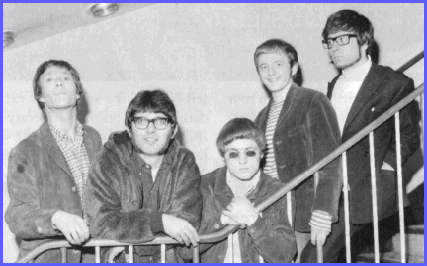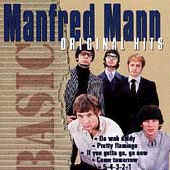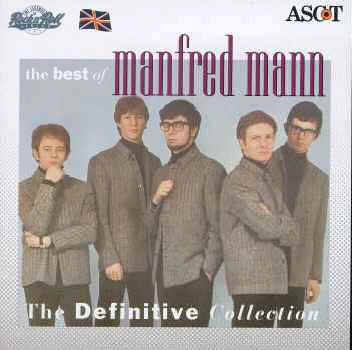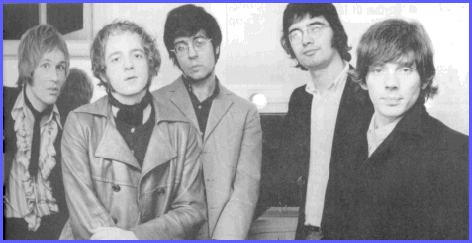Main Page
Index of Artists
Lulu & The Luvvers
Beryl Marsden
John Mayall's Bluesbreakers
The Merseybeats
The Migil 5
The Mojos
Zoot Money's Big Roll Band
The Moody Blues
Paul Jones - harmonica/vocals (born Paul Pond, February 24th 1942, Portsmouth) Manfred Mann - keyboards (born Michael Lubowitz, October 21st 1940, Johannesburg) Tom McGuinness - bass guitar (born December 2nd 1941, Wimbledon) Mike Vickers - guitar/saxophone (born April 18th 1941, Southampton) Mike Hugg - drums (born August 11th 1942, Andover) Manfred Mann were one of the leading R&B groups of the Sixties who recorded pop material to get into the charts. They broke through in the winter of 1964 when their third single release "5-4-3-2-1" (the theme for popular TV programme "Ready, Steady, Go") reached the top five. This was the first of a string of hits, mostly covers of American R&B or Bob Dylan songs. Mann began his career playing jazz in his native South Africa before he moved to England in 1961. The band was formed in London late in '62 as The Mann-Hugg Blues Brothers, initially they were a purist modern jazz band featuring two saxophonists and a trumpet player. With the addition of Paul Jones on vocals and harmonica and slimming down to a five-piece, they switched the emphasis to R&B and, after unsuccessfully auditioning for Pye and Decca, won a recording contract with HMV in 1963. It was at HMV's suggestion that the name of the group was changed to Manfred Mann. Both sides of their debut single were instrumentals, but the follow-up "Cock A Hoop" featured the charismatic Paul Jones' vocals. After the success of "5-4-3-2-1" they released the similarly-styled "Hubble Bubble Toil And Trouble" beofre really hitting the big time with two covers of songs by American girl groups - the Exciters' "Do Wah Diddy Diddy" and the Shirelles' "Sha La La". 1965 brought further success for the group, including Bob Dylan's "If You Gotta Go, Go Now" - the first of several Dylan songs they would record for single release during the 60's. In contrast to their singles, their album tracks often had a heavy R'n'B sound to them, covering songs by Willie Dixon, Muddy Waters, Howlin' Wolf as well as some perfectly competent original material. Vickers left towards the end of '65 with McGuinness switching to lead guitar and Jack Bruce coming in on bass from John Mayall's Bluesbrekers. Bruce in turn left to join Cream and was replaced by Klaus Voorman, and Paul Jones was replaced by Mike D'Abo from A Band Of Angels in the middle of 1966. None of these changes to the line-up, nor a switch to Fontana seemed to have any effect whatsoever on their commercial viability and they carried on hitting the charts regularly until the decade's end, albeit in a style increasingly distant from their jazz/R'n'B roots. Singles Jul '63 Why Should We Not?/ HMV POP 1189 - Oct '63 Cock A Hoop/ HMV POP 1225 - Jan '64 5-4-3-2-1/ HMV POP 1252 UK#5 Apr '64 Hubble Bubble Toil And Trouble/ HMV POP 1282 UK#11 Jul '64 Do Wah Diddy Diddy/ HMV POP 1320 UK#1 Oct '64 Sha La La/ HMV POP 1346 UK#3 Jan '65 Come Tomorrow/ HMV POP 1381 UK#4 Apr '65 Oh No, Not My Baby/ HMV POP 1413 UK#11 Sep '65 If You Gotta Go, Go Now/ HMV POP 1466 UK#2 Apr '66 Pretty Flamingo/ HMV POP 1523 UK#1 Jul '66 You Gave Me Somebody To Love/ HMV POP 1541 UK#36 Aug '66 Just Like A Woman/ Fontana TF 730 UK#10 Oct '66 Semi-Detatched Suburban Mr. James/ Fontana TF 757 UK#2 E.P.s 1964 5-4-3-2-1/Cock A Hoop/Without You/Why Should We Not? HMV 7EG 8848 1965 Groovin' HMV 7EG 8876 1965 The One In The Middle HMV 7EG 8908 Apr '66 Machines HMV 7EG 8942 Oct '66 Instumental Asylum HMV 7EG 8949 Dec '66 As Was HMV 7EG 8962 L.P.s Oct '64 The Five Faces Of Manfred Mann HMV CLP 1731 Oct '65 Mann Made HMV CLP 1911 Sep '66 Mann Made Hits HMV CLP 3559 Dec '66 As Is Fontana TL 5377 Paul Jones Single Oct '66 High Time/ HMV POP 1554 UK#4 L.P.
|
Dec '66 |
My Way - My Way/Lady Godiva/It Is Coming Closer/Can't Hold On Much Longer/Baby Tomorrow/You've Got Too Much Going For You/Very, Very Funny/High Time/She Needs Company/When My Little Girl Is Smiling/Wait Till Morning Comes/I Can't Break The NewsHMV CLP 3586 |
Selected Re-issues

|
|
Original Hits - Do Wah Diddy Diddy/Pretty Flamingo/5-4-3-2-1/Sha La La/Come Tomorrow/Oh No, Not My Baby/Hubble Bubble Toil And Trouble/If You Gotta Go, Go Now/The One In The Middle/Hi Lili Hi Lo/The Way You Do The Things You Do/There's No Living Without Your Loving/Since I Don't Have You/With God On Our Side/Stormy Monday Blues/I've Got My Mojo Working/I'll Make It Up With You/You Gave Me Somebody To Love |

|
1992 |
The Definitive Collection - Do Wah Diddy Diddy/Why Should We Not/Cock-A-Hoop/Now You're Needing Me/5-4-3-2-1/Hubble Bubble Toil And Trouble/I'm Your Kingpin/Do Wah Diddy Diddy (Unedited version)/Sha La La/Come Tomorrow/She/Dashing Away With The Smoothing Iron/Oh No, Not My Baby/My Little Red Book/The One In The Middle/I Can't Believe What You Say/If You Gotta Go, Go Now/There's No Living Without Your Loving/Tired Of Trying, Bored With Lying, Scared Of Dying/She Needs Company/Machines/When Will I Be Loved/Pretty Flamingo/Come Home Baby/You Gave Me Somebody To Love/Group Interview |

The Manfreds in '66 with new lead singer Mike D'Abo (extreme left)